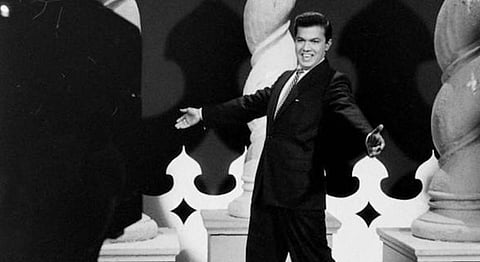
- HOMEGROWN WORLD
- #HGCREATORS
- #HGEXPLORE
- #HGVOICES
- #HGSHOP
- CAREERS
- ABOUT US
- CONTACT US

Earlier this year it was announced that Lilly Singh is set to host a late-night talk show on NBC. While it is a phenomenal step forward for people of Indian origin everywhere, its 2019. Things could easily be better and sadly it would still be unfair to say brown people are well represented in the American entertainment landscape. Any movement forward is a culmination of efforts of several entities in the past. So, while we gaze into the optimistic future before us, it’s only fair we shed light on heroes that we may have forgotten. And Kuldip Rae Singh is one such example.
In 1956, Kuldip Rae Singh appeared on Groucho Marx’s hit T.V. show ‘You Bet Your Life’ and sang a breath-taking rendition of Guys and Dolls’ “A Woman in Love”. With a palpable charisma and a slick greaser hairstyle, it seemed like there was no stopping Kuldip from entering Hollywood.
He handled the host’s ignorant questions with charismatic poise and wooed the audience. A son of an international lawyer, Kuldip was a medical student in UCLA. Kuldip hailed from Kashmir and took pride in his origins by describing the valleys as “beautiful and romantic”. When asked if he was interested in pursuing a career in music he coyly confessed, “I [would] love to do it but I don’t know if this wonderful American audience will accept me.”
He became an overnight success and was described as the “East Indian Warbler” and the “Crooner from Kashmir”. His predominantly female fan following consisted of 85 fan clubs, 8000 fan letters and several marriage proposals. An ice-cream company was even interested in the rights to his name to create a special “Kuldip” sundae. He got a record deal as ‘Cool Dip’ and even got few television appearances mostly because of his ‘exotic’ lineage.
However, only few weeks after his performance, he was targeted by the immigrant authority. Kuldip was on a student visa but had dropped out of college. He was deported and the general stigma around deportation served as a roadblock for his Hollywood dreams. He finally moved to Spain to finish his medical studies and then sadly faded into obscurity.
Even though we have moved forward as a global community, it’s really heart-breaking to see the racial undertones in Kuldip’s story. While Hollywood isn’t necessarily a benchmark of success, its important to eliminate the skewed representation of South Asian and other minorities on the more prominent platforms. Be it music, film, sports or art, its only fair that individuals get recognised for their talent and skill over their background and ethnicity. Only hope being that there are many more Kuldips in the world right now who will get an equal chance to sing their heart out.
If you enjoyed this article, we suggest you read:
